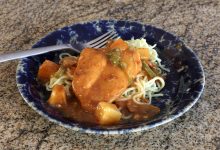🦃🍏☕️🍗🔥
The “Apple and Tea Brine, Injected, Rubbed, and Deep Fried Turkey” is a mouthwatering and innovative way to prepare a delicious Thanksgiving or special occasion turkey. It combines flavors from apple and tea, resulting in a unique and aromatic turkey experience.
Components:
- Turkey: You’ll need a whole turkey, usually between 10 to 15 pounds, depending on the number of servings you require.
- Brine: The brine typically consists of water, apple cider, tea bags (black or green tea), salt, sugar, and various spices and herbs like cinnamon, cloves, bay leaves, and rosemary.
- Injection: The injection liquid often includes a mixture of melted butter, apple cider, and additional spices or herbs.
- Rub: A dry rub is created from a blend of spices such as paprika, garlic powder, onion powder, thyme, and sage.
- Oil: You’ll need a high-temperature cooking oil (peanut oil is commonly used for deep frying).
History:
This particular turkey preparation method is a modern twist on traditional turkey recipes. While deep-frying turkeys has been popular in the Southern United States for decades, the addition of apple and tea flavors in the brine and injection is a more recent culinary innovation. It combines the Southern love for deep-frying with a creative blend of flavors.
Steps to Prepare:
-
Brine:
- In a large pot, combine water, apple cider, tea bags, salt, sugar, and spices.
- Bring the mixture to a boil, then let it cool to room temperature.
- Submerge the turkey in the brine, ensuring it’s fully covered.
- Refrigerate and let it soak for 12-24 hours, depending on the turkey’s size.
-
Injection:
- Mix melted butter, apple cider, and your choice of spices or herbs.
- Using an injector, distribute this mixture evenly throughout the turkey, especially in the breast and thigh areas.
-
Rub:
- Combine the dry rub ingredients in a bowl.
- Generously coat the turkey with the rub, ensuring it adheres to the skin.
-
Deep Frying:
- Heat your deep fryer to the appropriate temperature (usually around 350°F or 175°C).
- Carefully lower the turkey into the hot oil using a turkey basket or hook.
- Fry for about 3-4 minutes per pound (10-15 minutes per kg) until the turkey reaches an internal temperature of 165°F (74°C).
- Carefully remove the turkey from the oil and let it drain on paper towels.
-
Rest and Serve:
- Allow the turkey to rest for about 20-30 minutes before carving.
- Carve and serve your beautifully fried turkey with your favorite sides and garnishes.
Time Needed:
- Brining: 12-24 hours
- Injection and Rub: 20-30 minutes
- Deep Frying: 3-4 minutes per pound (10-15 minutes per kg)
- Resting: 20-30 minutes
Overall, the preparation and cooking time will vary depending on the size of your turkey, but you can typically expect to spend a day or more for brining and several hours for the injection, rub, frying, and resting stages. The result is a juicy, flavorful, and crispy turkey that’s sure to impress your guests! 🍽️🦃👌
Certainly, here are some general nutrition facts and health information for the “Apple and Tea Brine, Injected, Rubbed, and Deep Fried Turkey” recipe:
Nutrition Facts (Approximate, per 3-ounce (85g) serving of turkey):
- Calories: Approximately 150-200 calories
- Protein: About 20-25 grams
- Total Fat: Around 7-10 grams
- Saturated Fat: Approximately 2-3 grams
- Trans Fat: Negligible
- Cholesterol: About 60-70 milligrams
- Sodium: Varies depending on brine and rub ingredients; can be high due to the brine.
- Carbohydrates: Negligible (less than 1 gram)
- Fiber: Negligible
- Sugars: Negligible
Health Information:
-
Protein: Turkey is an excellent source of lean protein, which is essential for muscle growth and repair.
-
Fat: While turkey is relatively low in fat compared to other meats, the deep-frying process does add some fat. However, the skin becomes crispy and less of the oil is absorbed if the turkey is properly fried.
-
Saturated Fat: Deep-frying can increase the saturated fat content, but if you remove the skin before eating, it reduces the saturated fat significantly.
-
Cholesterol: Turkey is a good source of dietary cholesterol. It’s advisable for individuals with high cholesterol levels to consume it in moderation.
-
Sodium: The sodium content can be relatively high due to the brining process. If you are watching your sodium intake, you can modify the brine recipe by reducing the salt content.
-
Carbohydrates: Turkey is very low in carbohydrates, making it a suitable choice for low-carb diets.
-
Fiber and Sugars: Turkey is naturally low in fiber and sugars, making it a good choice for those managing blood sugar levels.
-
Moderation: As with any indulgent dish, moderation is key. While this recipe is delicious, it’s important to balance it with other nutritious foods.
-
Skin: Removing the skin from the turkey before consumption can significantly reduce the fat and calorie content.
-
Variations: You can make this dish healthier by using leaner cuts of turkey and adjusting the brine and injection ingredients to reduce salt and sugar content.
Remember that the nutritional content may vary depending on specific ingredients and preparation methods used, so it’s a good idea to calculate precise values based on your recipe if you have specific dietary concerns or requirements. Enjoy your meal in moderation as part of a balanced diet! 🦃🍽️🥗



